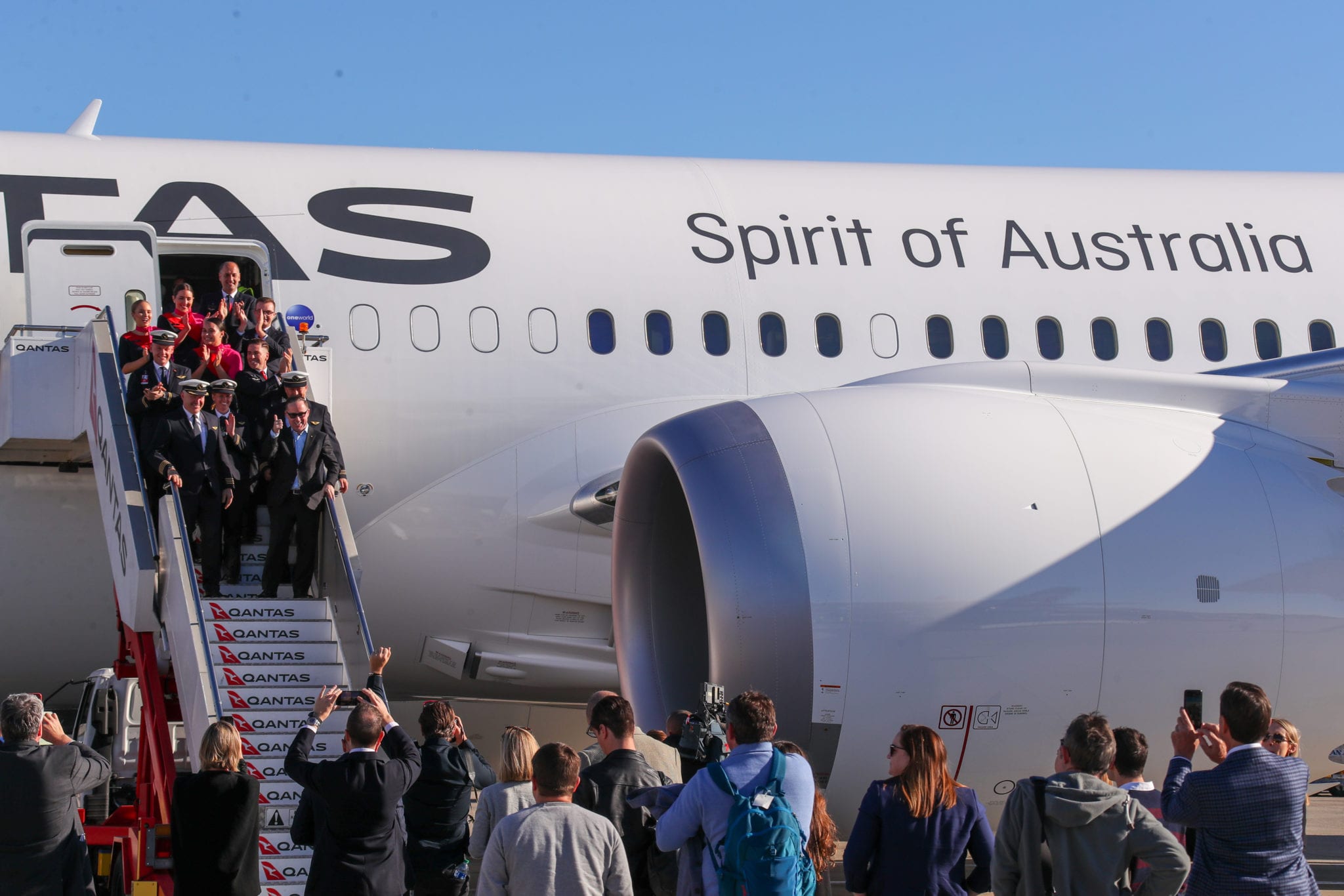Ultra Long Haul: The GEnx Powers Record Breaking 19-Hour New York to Sydney Flight
October 21, 2019 | by Gina Daugherty
GE Aviation was honored to power Qantas’ Project Sunrise nonstop flight from New York to Sydney in a record-breaking 19 hours and 16 minutes with the GEnx engine.
On Saturday, October 19, a total of 49 passengers and crew participated in the historic flight, covering 10,200 miles of land and sea and crossed 15 time zones. The flight on the 787-9 was the first of three ultra long-haul research flights by Qantas as part of feasibility testing to ultimately start regular commercial revenue service on this route using the Boeing 777X or Airbus A350. The flight gathered new data about inflight passenger and crew health and wellbeing.
“Congratulations to Qantas on this remarkable achievement,” said Mahendra Nair, GEnx Program General Manager. “This is truly technology coming together — from jet engine, airplane, and the airline.”
The pioneering first non-stop flight from New York to Sydney became possible in part due to the technology incorporated on Boeing’s 787 Dreamliner and GEnx engines, including superior fuel burn and reliability of the GEnx product line.
Key to GEnx engine's performance are its high pressure compressor, lean-burning combustor and lightweight durable composite materials. With the highest pressure ratio compressor in commercial service today, the GEnx has the best fuel efficiency in its thrust class, enabling it to power many of the longest routes. These leading-edge technologies and the engine's elegant architecture bring in high operational reliability, excellent utilization rate and route flexibility for more flights per year and more revenue for airlines.
“We built the GEnx to allow our customers to be entirely flexible on whatever route they want to fly,” said Jim Leister, GEnx-1B Executive Program Manager for GE Aviation. “From 30-minute flights to 20-hour flights, our technology is enabling new direct flights for the airlines.”
Last year, Qantas on GEnx powered Boeing 787 opened the direct route from Perth to London, another first non-stop passenger flight, covering more than 9,000 miles with a duration of 17 hours and 20 minutes.
Two more Project Sunrise research flights are scheduled for this year. One in November will fly from London to Sydney, and another in December will do the New York-to-Sydney route again. Qantas’ goal is to operate regular, nonstop ultralong flights like these from Australia to and from London and New York starting in 2022 or 2023 using the Boeing 777X or Airbus A350.
On Saturday, October 19, a total of 49 passengers and crew participated in the historic flight, covering 10,200 miles of land and sea and crossed 15 time zones. The flight on the 787-9 was the first of three ultra long-haul research flights by Qantas as part of feasibility testing to ultimately start regular commercial revenue service on this route using the Boeing 777X or Airbus A350. The flight gathered new data about inflight passenger and crew health and wellbeing.
“Congratulations to Qantas on this remarkable achievement,” said Mahendra Nair, GEnx Program General Manager. “This is truly technology coming together — from jet engine, airplane, and the airline.”
The pioneering first non-stop flight from New York to Sydney became possible in part due to the technology incorporated on Boeing’s 787 Dreamliner and GEnx engines, including superior fuel burn and reliability of the GEnx product line.
 Above: The crew of Qantas' pioneering nonstop flight from New York City to Sydney. The flight was powered by the GEnx, which has the best fuel efficiency in its thrust class, enabling it to power many of the longest routes. Top: Qantas' Boeing 787-9 Dreamliner, powered by two GEnx engines. Photo credits: Photo by James D Morgan/Qantas.
Above: The crew of Qantas' pioneering nonstop flight from New York City to Sydney. The flight was powered by the GEnx, which has the best fuel efficiency in its thrust class, enabling it to power many of the longest routes. Top: Qantas' Boeing 787-9 Dreamliner, powered by two GEnx engines. Photo credits: Photo by James D Morgan/Qantas.
Key to GEnx engine's performance are its high pressure compressor, lean-burning combustor and lightweight durable composite materials. With the highest pressure ratio compressor in commercial service today, the GEnx has the best fuel efficiency in its thrust class, enabling it to power many of the longest routes. These leading-edge technologies and the engine's elegant architecture bring in high operational reliability, excellent utilization rate and route flexibility for more flights per year and more revenue for airlines.
“We built the GEnx to allow our customers to be entirely flexible on whatever route they want to fly,” said Jim Leister, GEnx-1B Executive Program Manager for GE Aviation. “From 30-minute flights to 20-hour flights, our technology is enabling new direct flights for the airlines.”
Last year, Qantas on GEnx powered Boeing 787 opened the direct route from Perth to London, another first non-stop passenger flight, covering more than 9,000 miles with a duration of 17 hours and 20 minutes.
Two more Project Sunrise research flights are scheduled for this year. One in November will fly from London to Sydney, and another in December will do the New York-to-Sydney route again. Qantas’ goal is to operate regular, nonstop ultralong flights like these from Australia to and from London and New York starting in 2022 or 2023 using the Boeing 777X or Airbus A350.





